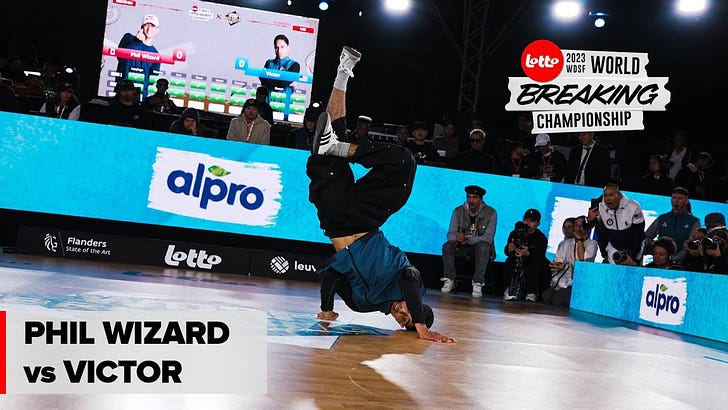An American's Guide to Olympic Breaking
Breaking is unlike any other sport ever selected to be in the Olympics—and it only has one shot to prove it belongs.
This is part 8 of RINGS RODGE, a roughly 15-part series where Olympics obsessive and journalist Rodger Sherman breaks down a different sport every day heading up to the 2024 Paris Olympics. You can probably get serious previews of the most popular sports on other sites… here, we’re doing unserious previews of sports that aren’t regularly on TV in between the four years between Olympics. Rodger didn’t really time things right so he’s not going to be able to get to all the sports BUT HE’S GOING TO TRY HIS BEST TO DO AS MANY AS POSSIBLE.
Today: Breaking!
Why should I care about Olympic breaking?
I don’t think you need convincing. You’re gonna watch the Olympic breaking. When I asked my subscribers which sports I should preview, breaking was by far the most popular response.
It’s the only debuting sport at Paris 2024. It’s one of the all-time oddest choices for the Olympics, a hip-hop-era invention which hasn’t traditionally been considered a competitive sport. It’s simultaneously the most modern event the Olympics have ever included—and an addition made about 40 years after breaking had its moment in the public imagination. (I can’t wait for America to win the Olympic gold in Twerking in 2068.)
The broader concept behind breaking—athletes performing artistic, yet technically difficult and athletically challenging routines to a musical backing track—is common to the Olympics. The Winter Games have figure skating while Summer Games have the floor routine in gymnastics and dressage in equestrian. (Yes, the horses are athletes!)
However, breaking adds a more aggressive head-to-head element: The breakers are competing one-on-one, often getting in each other’s faces, with judges simply deciding which performer did a better job rather than evaluating the performance based a complex grading system. Here’s the final of the most recent World Championships between Team USA’s B-Boy Victor and Canada’s Phil Wizard:
Most urgently, this might be the only Olympic appearance for breaking—and as you can see, it’s fun as hell to watch, so you’d better watch it now while it’s still here.
So wait, this is a sport?
It checks all the boxes. Breaking clearly requires exceptional athleticism and coordination, and has always had a competitive element. That’s… that’s sports, right?
From the early days of breaking, b-boys and b-girls went head-to-head in breaking battles. There have been cash competitions for decades, and in 2004, Red Bull launched its BC One tour to find a world champion. But generally, sports selected to be in the Olympics have a long history of global championships governed by an international federation. That’s not at all the case with breaking.
The event is being held according to rules set by the World DanceSport Federation, which has put on international dancing competitions since the 1950s. (And yes, they do insist on using the phrase “DanceSport.”) But WDSF competitions have traditionally been in ballroom dancing. The WDSF didn’t host its first breaking World Championship until 2019, well after the IOC had made clear it wanted breaking in the Olympics. The WDSF has been a part of the World Games—sort of like the minor leagues for Olympic sports which don’t make the cut—since 1997, but the first breaking competition at the World Games was just two years ago, in Birmingham, Alabama.
In 2018, Dvora Meyers wrote on Deadspin about the push to get breaking in the Olympics—a push which seemed like an astroturfed effort from international sporting organizations rather than a response to what people in the breaking community actually wanted. It’s easy to be a skeptical about an international ballroom dancing organization based in Lausanne, Switzerland seizing on an art form invented on the streets of New York and using it to secure a slice of the Olympic pie.
So wait, this is an Olympic sport?
Yes… although maybe just this one time.
Breaking was one of the optional sports added by the Paris hosting committee, alongside skateboarding, sport climbing, and surfing. It was the culmination of a years-long journey which felt astroturfed by the IOC in hopes of pursuing a younger audience.
It seemed like breaking would be a shoo-in for the LA 2028 games, considering the sport was invented in the United States…. and the iconically bad breakdancing movie Breakin’ took place in Venice Beach.
The WDSF released an unusually huffy statement about the snub, saying that they were “profoundly disappointed”, but ready to pitch the Brisbane 2032 committee. That decision should come in two or three years.
That makes the Paris breaking competition even more important—both for the federation, which is trying to prove it deserves a spot in future games, and for the breakers, who realistically only have one chance to win an Olympic gold. (What are the odds breaking makes it into the 2032 games and the current set of breakers are still capable of winning eight years from now?)
To borrow words from a song about a slightly different single-elimination bracket competition in an art form invented by Black Americans… breaking has one shot, one opportunity. Will they let it slip?
So is this like You Got Served?
No, idiot! Breaking is only one form of competitive hip-hop dancing! And the Olympic breaking competition involves one-on-one dancing rather than battles between crews. Idiot!
I you are looking for a breaking movie, B-Boy Victor says his breaking career was sparked watching the movie Beat Street with his dad as a child:
How does this work?
The format itself is actually easier to understand than just about any sport in the Olympics. There’s a single-elimination bracket of 16 breakers. In each battle, breakers trade off 60-second routines, and the judges essentially make a head-to-head judgment on which of the two breakers performed better.
The judging system is, for better or worse, almost entirely vibes-based. There’s no complicated scoring system where certain moves with technical names are worth certain points. There is, however—and I swear to you I’m not making any of this up—a three-part scoring system which attempts to grade the “body, mind, and soul” of the dancers. Here is an actual screenshot of the official rulebook.
Each of those broad metaphysical concepts is divided into two more easily defined categories on which the dancers can be judged: technique and variety (body), creativity and personality (mind), and performance and musicality (soul). Personally, I’m just gonna watch and decide which dancers I like better without trying to figure out who’s getting more soul points.
What makes breaking different than other Olympic sports?
The B-Boys and B-Girls are allowed to choose their own names. At the 2023 world championships, B-Boy Phil Wizard won silver for Canada and B-Girl Syssy won bronze for France. Competitors in Paris include B-Boy Quake from Taiwan and and B-Girl Raygun from Australia. (I think I’m supposed to say B-Boy and B-Girl every time.) The judges also use stage names—the 2023 World Champs were judged by a panel including Crumbs, Steez, and Lazylegz.
Team USA is comprised of B-Boy Jeffro (birth name: Jeffrey Louis) and B-Girls Sunny (Grace Sun Choi) and Logistx (Logan Edra)… as well as the gold medal favorite, Victor Montalvo, who chooses to go by B-Boy Victor. I guess there’s a little bit of a double entendre going on there (the victor is Victor) but it feels like he used up all the creativity on the moves and the dancing and stuff. (Not that I’m one to speak as I couldn’t even come up with a good name for my Substack.)
Unlike gymnastics or figure skating, the dancers have no say over what music gets played. They’re reacting live to whatever the DJ spins. The official rules actually don’t provide any guidance about what type of music should be played—they merely state that the music must be “appropriate breaktracks without explicit lyrics” and that in one round, the DJ must play the same music or both competitors. However, the DJs seem to universally stick to relatively standard uptempo 4/4 breakbeats. The dancers are in serious trouble if the DJ busts out “Blue Rondo a la Turk” by the Dave Brubeck Quartet in the gold medal round.
Is Team USA good at breaking?
Yes! We invented it!
The favorite on the men’s side is B-Boy Victor, an Orlando native, probably the most decorated breaker of all time. He won the 2021 and 2023 World Championships, the 2022 World Games, and the 2022 Red Bull BC One championship. He told Esquire that he won so much that winning started to become boring—until the announcement of Olympic breakdancing, presenting him with a new thing to win.
Here’s Victor in the World Games championship match—an all-USA affair, Team USA’s other Olympian in the men’s competition, B-Boy Jeffro, won the silver. (They’re not obligated to wear any sort of national team uniform, but Victor wearing the USMNT 2022 World Cup jersey was a nice touch.)
American B-Girl Sunny won a silver at the World Games—pretty impressive, considering she was still working her way up the corporate ladder. The Penn alum was the director of global creative operations for Estée Lauder, a job she quit in 2023 to focus on breaking full-time with the Olympics coming up. She’s never won a major global competition before, but maybe her desk job was holding her back. And Logistx won the 2021 Red Bull BC One, so she can win at the highest level as well.






Finally!!!😅🙏🏼